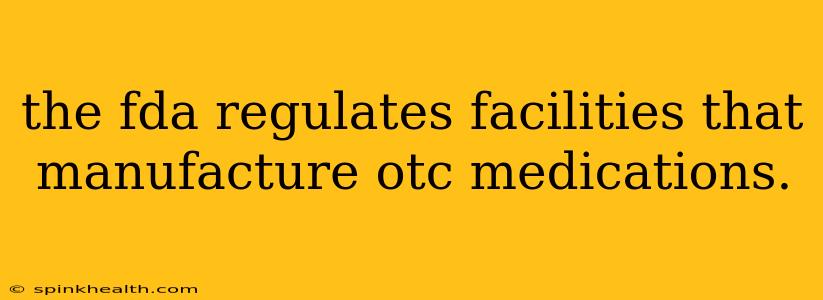The FDA's Role in Overseeing OTC Medication Manufacturing: A Deep Dive
The Food and Drug Administration (FDA) plays a crucial role in ensuring the safety and efficacy of over-the-counter (OTC) medications. Their oversight extends far beyond simply approving the medications themselves; it encompasses the entire manufacturing process, from the sourcing of raw materials to the final product reaching store shelves. This isn't just a matter of ticking boxes; it's a complex system designed to protect public health. Let's delve into the specifics of how the FDA regulates these facilities.
Imagine a world where you couldn't trust the aspirin you bought. That's the reality the FDA prevents. Their regulatory power ensures that every step in the manufacturing process adheres to stringent guidelines. This involves regular inspections, meticulous documentation requirements, and rigorous testing procedures. It’s a story of meticulous detail, constant vigilance, and a profound commitment to public safety.
How Does the FDA Regulate OTC Medication Manufacturing Facilities?
The FDA's authority stems from the Federal Food, Drug, and Cosmetic Act (FD&C Act). This act empowers them to inspect manufacturing facilities, review manufacturing processes, and enforce regulations to ensure quality control. This oversight is not a one-time event; it's an ongoing process.
Inspections: FDA inspectors conduct unannounced inspections of OTC medication manufacturing facilities. These inspections are comprehensive, covering everything from the cleanliness of the facility to the accuracy of labeling and the integrity of the manufacturing process. They're looking for adherence to Good Manufacturing Practices (GMPs). Failing to meet GMP standards can lead to warnings, fines, and even facility closure.
GMPs (Good Manufacturing Practices): These are a set of guidelines that dictate the minimum standards for manufacturing, processing, packaging, and holding of medications. These standards are designed to minimize the risk of contamination, errors, and deviations from the approved product specifications. GMP compliance is non-negotiable for any facility producing OTC drugs.
Documentation: Meticulous record-keeping is paramount. Facilities must maintain detailed records of every step in the manufacturing process, from the origin of raw materials to the final product's distribution. This documentation allows for thorough traceability, enabling the FDA to quickly identify and address any potential problems. Think of it as a detailed audit trail ensuring accountability at every stage.
Testing and Quality Control: Rigorous testing is conducted at various stages of the process. Raw materials are tested for purity and potency, and the finished product undergoes extensive testing to verify its quality, efficacy, and safety. This includes testing for contaminants, potency, and consistency. Only products meeting strict quality standards are released for sale.
What Happens if a Facility Doesn't Comply with FDA Regulations?
Non-compliance can result in a range of consequences, from warnings and official actions to facility closures and product recalls. The FDA takes violations very seriously. The severity of the consequences depends on the nature and extent of the violation. A minor issue might result in a warning letter, while a serious violation, such as the discovery of contaminated products, could lead to a complete shutdown of operations and potentially criminal charges.
What are the Benefits of FDA Regulation?
The benefits of FDA regulation are clear. It protects consumers from potentially harmful or ineffective medications. By maintaining high standards, the FDA ensures that the OTC medications available to the public are safe, effective, and accurately labeled. This public health safeguard is fundamental to consumer trust and well-being.
Does the FDA regulate all OTC medications in the same way?
While the FDA’s overarching principles apply to all OTC medications, the specifics of regulation can vary depending on the active ingredients and the complexity of the manufacturing process. Some OTC medications might require more stringent testing or more frequent inspections than others. The FDA carefully assesses risk factors to tailor its approach to each individual medication.
How can I find out more about FDA regulations regarding OTC medication manufacturing?
You can find comprehensive information on the FDA website, which contains detailed guidance documents, regulations, and enforcement actions. This resource provides a wealth of information for anyone interested in learning more about the FDA’s role in ensuring the safety of OTC medications. It's a valuable tool for both consumers and industry professionals.
In conclusion, the FDA's rigorous regulation of OTC medication manufacturing facilities is not just bureaucratic red tape; it's a critical public health safeguard that ensures the quality, safety, and efficacy of the medications we rely on daily. It's a story of vigilance, precision, and a steadfast commitment to protecting consumers.

